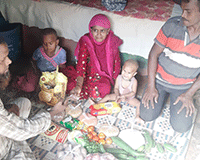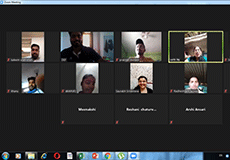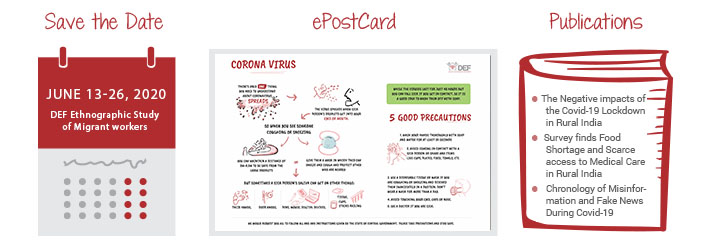


India has been under lockdown since March 24, 2020, to break the spread of Covid-19 infection. While it is the only solution to avoid community spread, many like migrant workers, marginalised communities and poorest of the poor are adversely affected due to the lack of information, livelihood and connectivity. Digital Empowerment Foundation (DEF) launched the Digital Emergency Relief Programme through its Community Information Resource Centers (CIRC) across 600+ locations in India who have been rigorously responding to the crisis by reaching out to the most vulnerable communities. Read More






Through government scheme linkages, Mazhrul Islam, center coordinator of USIPI-CIRC Center in Ranchi, is ensuring the distribution of free gas cylinders under Ujjwala Scheme to help women not fall back to cooking food using firewood in these financially strained times. Ujjwala scheme under central government encourages households to opt for LPG cylinders to help them shift from using firewood. Under the covid-19 relief package by the central government, the women beneficiaries of Ujjwala scheme will get free cylinder for next three months if they run out of gas. Mazhrul Islam has helped in providing linkages to nearly 300 people.

On the occasion of World Menstrual Hygiene Day, Smartpur teams across 100 locations in India ensured awareness, tackled myths and taboos surrounding menstruation through discussions and activities both online and offline. The team of Kurumalai, TamilNadu, showed solidarity by wearing bracelet made up of beads. They further discussed about the importance of Menstrual Hygiene Day along with the reason as to why it is celebrated on May 28. The adolescent girls also shared about their first menstrual cycle. Menstrual Hygiene Day was celebrated in a unique manner at the Smartpur Chirala, Andhra Pradesh centre where the girls were not just empowered with right knowledg... Read More


The major casuality in times of the pandemic has been information and access to it. According to a DEF survey conducted in rural India, the vast majority of respondents said that either there is a rampant spread of misinformation, fake news or there is lack of information which is creating panic. Our mentees Archana Munda, Dayamani Munda, Sushila Kumari and others are doing a commendable job by organizing awareness drives during lockdown to fight this. They are doing wall painting in their areas and making circle marks in front of Ration shop and other essential points to ensure social distancing.

Google Assistant is an artificial intelligence–powered virtual assistant developed by Google that is primarily available on mobile and smart home device. Google Assistant can engage in two-way conversations. DEF has partnered with Google and have Selected Assistant Community Leads (ACLs) to drive digital literacy initiative with access to information with Google Assistant. “Assistant Community Leads (ACLs)” means Assistant power-users trained to help educate the community of users they engage with Google Assistant. During the training given to end user or beneficiary, ACLs need to understand the core needs from mobile device. Read More


The SoochnaPreneurs, Nirmala Devi, Kiran Devi, Arti Devi from Angara and Arti Devi, Rupam Devi and Shakuntala Devi of Sonahatu have stepped forward to help the vulnerable communities in this difficult time of Covid-19. Under state government’s “Didi Kitchen Yojna”, the six Soochnapreneurs have been cooking food since the lockdown started and distributing them the poorest of the poor including daily wagers, farmers, labors. Since, many are not able to reach the spot where they are distributing, the women have started home-delivery especially for old age persons, ailing and young children. Till date, they have served over 100 people.

DEFs Samarth SoochnaPreneurs are going one step ahead to extend help to their communities in times of covid-19. According to a DEF survey, there is a huge lack of masks and sanitisers in rural India. Two of our Samarth SoochnaPreneurs- Sudama Mahto and Bishtu Mahto-undertook the task of making masks to help bridge this gap. They have prepared nearly 400 masks and distributed them among the frontline workers, security persons and to those in need. The head of the local administration provided them with the raw material to help them in this and ensure the protection of the community.


Lakme Fashion Week has launched a campaign- All About India- to showcase stories that portray resilience and the desire to innovate to combat tough times. In this phase of the campaign, they will highlight artisans and their work towards making self-protective masks for the masses. The aim is to highlight how they form the backbone of the industry by using their skills for developing products they may have never imagined. DEF has collaborated with them and highlighted a story of a weaver from Nuapatna, Odisha. Bijaya Nayak comes from a traditional weavers’ family and associated with DEF’s Digikala project. Read More

Diverse colours of threads that not so long ago adorned the streets every morning have stopped appearing. People singing and the sounds of the looms working is getting fainter by the day. Hundreds of looms have paused and the condition of weavers and artisans is deteriorating. “Essential items have become costlier. Now, getting food is becoming difficult because there is no work or earning,” said Mohammed Shiraj Ansari from Saidanpur cluster of Barabanki in Uttar Pradesh who is one of the 50,000 weavers in that region alone. The lockdown has affected the mere Rs100-120/- that they used to earn as a daily wage. Clusters across India have the same story to tell. Read More


COVID-19 pandemic has further fractured India's complex information ecosystem. The scoping survey conducted by DEF on pandemic related misinformation circulating within communities received 378 responses from 15 states in India. The survey showed four major categories of misinformation: fake medical advice, Islamophobia, rumours about consumption of certain food and poultry and conspiracy theories undercut by uncritical belief. One of the most important findings of this exercise was that misinformation not only spreads through social media platforms but also through word of mouth within personal networks, public meeting spaces, and informal interactions. The article is available in both English and Hindi.

COVID-19 has posed one of the biggest challenges across the globe. Almost every country has been under lockdown to prevent its infection and following the social distancing norm. In India too, the lockdown was announced by the Central Government in different phases from March 25, 2020 onwards, which is now being continued by the state governments in different ways. The lockdown has almost stopped the economic activities, leading to mass unemployment. Due to lack of work, millions of people returned homes in their villages. However, the central government announced an economic package, but due to the government's policies, millions of families slipped through the cracks of benefits. Read More.





Research executive at New Delhi’s Digital Empowerment Foundation

The global healthcare crisis has led to the decline of multiple sectors across countries and communities. Stories about families unable to perform last rights, hospitals reaching patient capacity, unavailability of hospital beds, exhausted and overworked healthcare workers, migrants travelling long distances to reach home, among gut wrenching incidents of apathy have made our realities somber. With the number of covid positive cases on the rise, spreading awareness regarding social distancing, washing hands and wearing masks is crucial. But only having information about this is not enough, what is most important is availability of preventive resources. Read More
House No. 44, 3rd Floor, Kalu Sarai, New Delhi | def@defindia.net | www.defindia.org | +91-11-26532786




